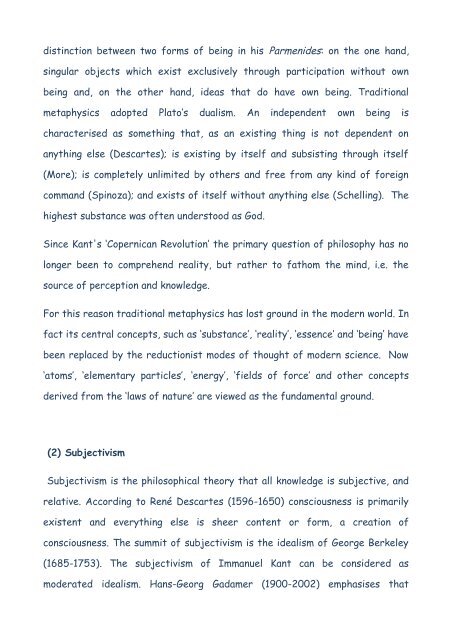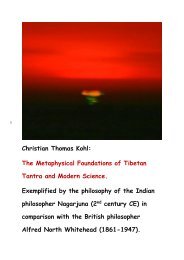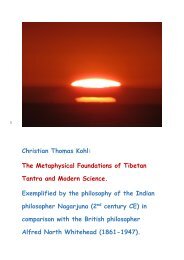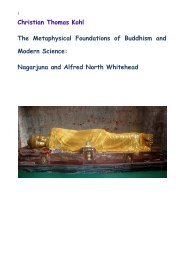Christian Thomas Kohl The Metaphysical Foundations of Buddhism and Modern Science
Christian Thomas Kohl The Metaphysical Foundations of Buddhism and Modern Science
Christian Thomas Kohl The Metaphysical Foundations of Buddhism and Modern Science
You also want an ePaper? Increase the reach of your titles
YUMPU automatically turns print PDFs into web optimized ePapers that Google loves.
distinction between two forms <strong>of</strong> being in his Parmenides: on the one h<strong>and</strong>,<br />
singular objects which exist exclusively through participation without own<br />
being <strong>and</strong>, on the other h<strong>and</strong>, ideas that do have own being. Traditional<br />
metaphysics adopted Plato’s dualism. An independent own being is<br />
characterised as something that, as an existing thing is not dependent on<br />
anything else (Descartes); is existing by itself <strong>and</strong> subsisting through itself<br />
(More); is completely unlimited by others <strong>and</strong> free from any kind <strong>of</strong> foreign<br />
comm<strong>and</strong> (Spinoza); <strong>and</strong> exists <strong>of</strong> itself without anything else (Schelling). <strong>The</strong><br />
highest substance was <strong>of</strong>ten understood as God.<br />
Since Kant's ‘Copernican Revolution’ the primary question <strong>of</strong> philosophy has no<br />
longer been to comprehend reality, but rather to fathom the mind, i.e. the<br />
source <strong>of</strong> perception <strong>and</strong> knowledge.<br />
For this reason traditional metaphysics has lost ground in the modern world. In<br />
fact its central concepts, such as ‘substance’, ‘reality’, ‘essence’ <strong>and</strong> ‘being’ have<br />
been replaced by the reductionist modes <strong>of</strong> thought <strong>of</strong> modern science. Now<br />
‘atoms’, ‘elementary particles’, ‘energy’, ‘fields <strong>of</strong> force’ <strong>and</strong> other concepts<br />
derived from the ‘laws <strong>of</strong> nature’ are viewed as the fundamental ground.<br />
(2) Subjectivism<br />
Subjectivism is the philosophical theory that all knowledge is subjective, <strong>and</strong><br />
relative. According to René Descartes (1596-1650) consciousness is primarily<br />
existent <strong>and</strong> everything else is sheer content or form, a creation <strong>of</strong><br />
consciousness. <strong>The</strong> summit <strong>of</strong> subjectivism is the idealism <strong>of</strong> George Berkeley<br />
(1685-1753). <strong>The</strong> subjectivism <strong>of</strong> Immanuel Kant can be considered as<br />
moderated idealism. Hans-Georg Gadamer (1900-2002) emphasises that


















